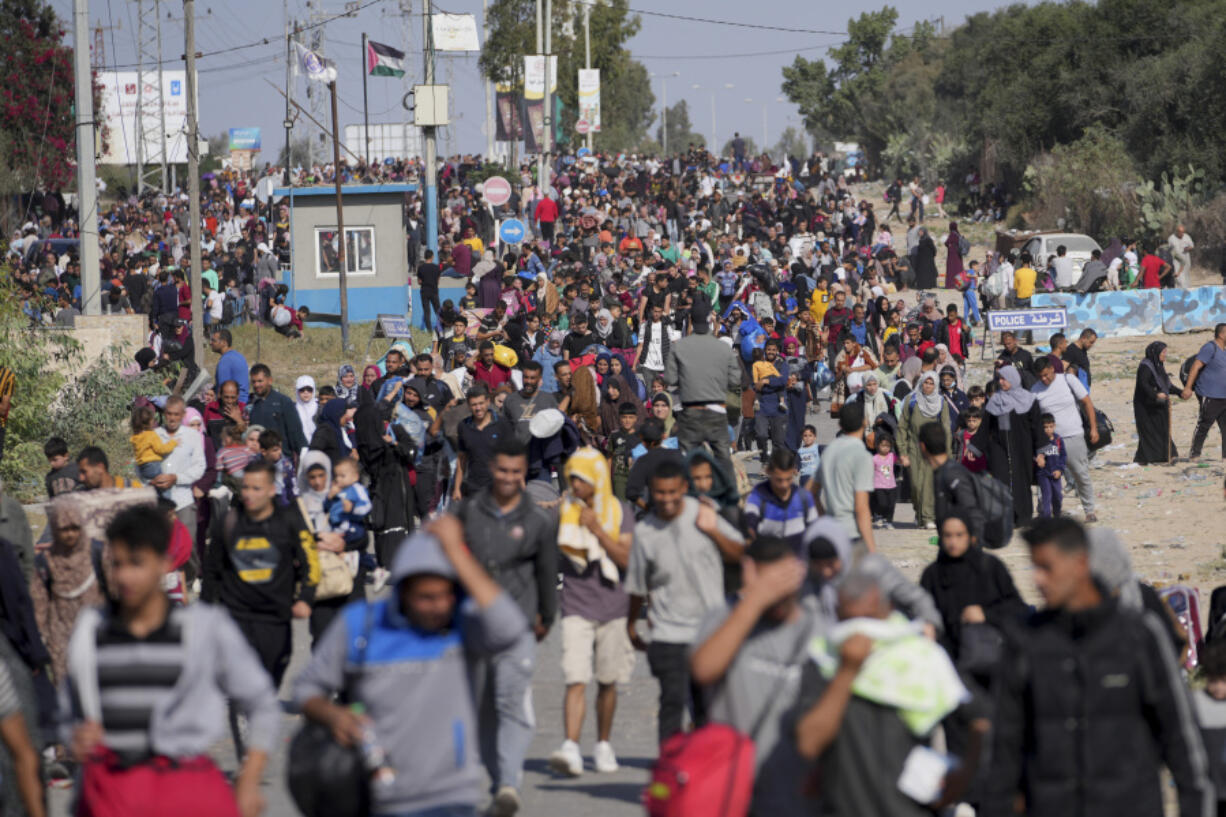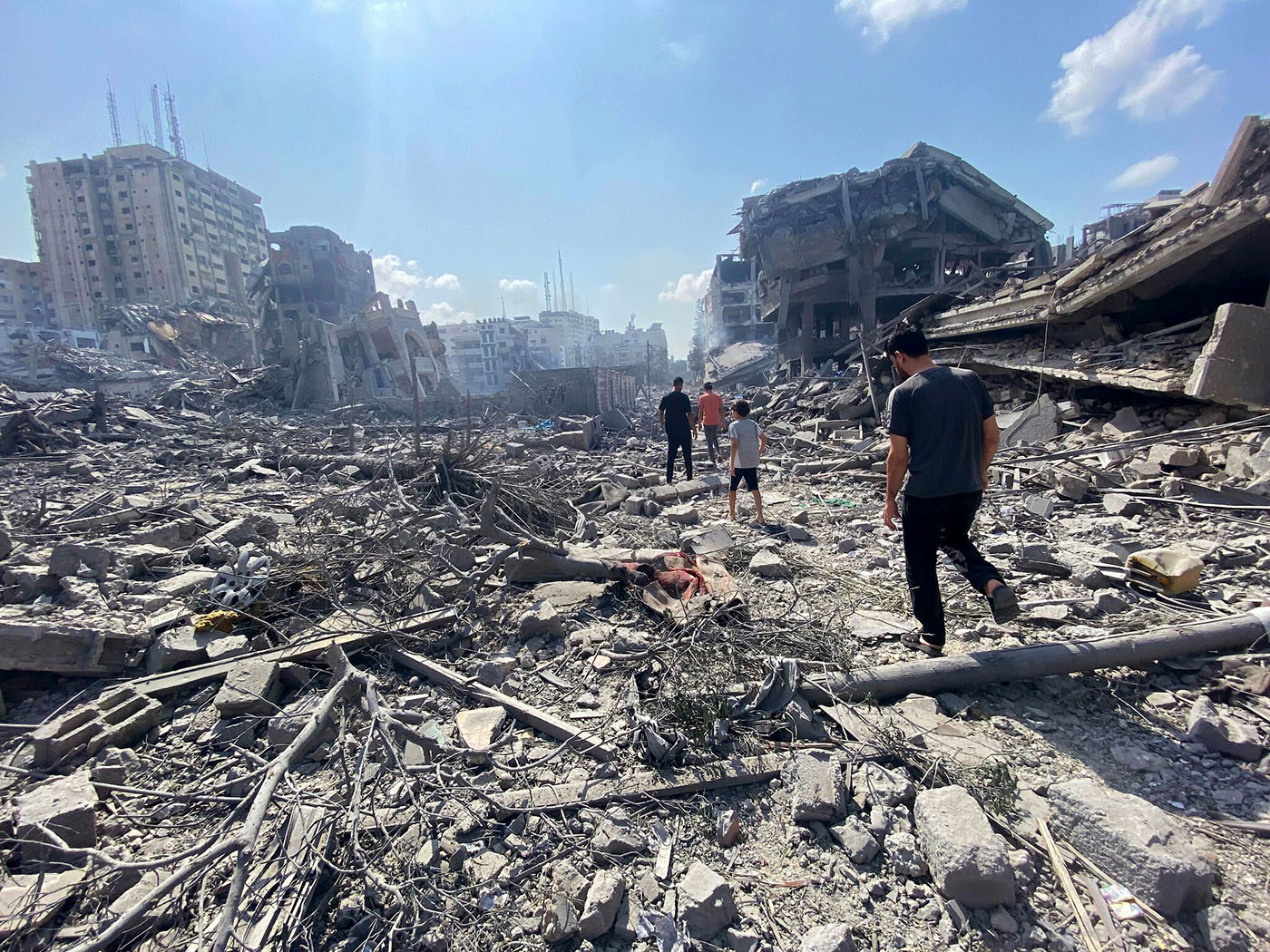A couple of weeks ago, Australian journalist and author Antony Loewenstein, a longtime Israel-Palestine observer, won the 2023 Walkley Book Award (Australia’s equivalent of the Pulitzer) for his latest work, The Palestine Laboratory: How Israel Exports the Technology of Occupation Around the World (Verso 2023). A TMR contributor to our GAZA issue, we asked Antony to present the book in this new excerpt. He is the author of one of our most-read stories, published during the last major assault on Gaza in 2021, The Warm, Resilient and Steadfast People of Gaza.
Antony Loewenstein
History didn’t begin on October 7, 2023. Palestine was occupied long before then.
And yet the brutal Hamas attacks on October 7 were unprecedented. Daring in execution and merciless towards Israeli civilians, the Israeli response was always going to be overwhelming. True to form, the Jewish state unleashed a disproportionate bombardment of Gaza, killing at least 15,000 civilians at the time of writing and displacing the majority of 2.3 million Palestinian citizens residing there. Most of my Gazan friends have lost their homes, refugees in their own land.
My book was released in May 2023, nearly six months before the Hamas attacks, but it’s exploded in popularity around the world since October 7 because many people want to understand how Israel tried (and failed) to imprison the entire population of Gaza in a techno-dystopian jail. Gazans have long been the ultimate guinea-pigs in a cruel, 24/7 testing ground with the most sophisticated forms of Israeli drones, surveillance equipment and “smart” fences. However, Israel fell victim to technical hubris, the belief that the most expensive forms of repressive tech would bring security.
Israelis will never be safe while Palestinians live under occupation.
Killing or injuring Palestinians should be as easy as ordering pizza. That was the logic behind an Israeli military-designed app in 2020 that allowed a commander in the field to send details about a target on an electronic device to troops who would then quickly neutralize that Palestinian. The colonel working on the project, Oren Matzliach, told the Israel Defense website that the strike would be “like ordering a book on Amazon or a pizza in a pizzeria using your smartphone.” 1

This kind of dehumanization is the inevitable result of endless occupation. It is also an export asset. What’s appealing to growing numbers of regimes globally is learning how Israel gets away with politicide. That term was adapted to Israel/Palestine by the late Israeli scholar and professor of sociology Baruch Kimmerling, who argued in 2003 that Israel’s domestic and foreign policy is “largely oriented towards one major goal: the politicide of the Palestinian people. By politicide I mean a process that has, as its ultimate goal, the dissolution of the Palestinian people’s existence as a legitimate social, political, and economic entity. This process may also but not necessarily include their partial or complete ethnic cleansing from the territory known as the Land of Israel.” 2
A rare moment of Israeli political honesty came in October 2021 when far-right Israeli parliamentarian Bezalel Smotrich, leader of the Religious Zionist Party and ally of Prime Minister Benjamin Netanyahu, said in the Knesset to the Arab members, “You’re only here by mistake, because [founding prime minister David] Ben-Gurion didn’t finish the job, didn’t throw you out in ’48.” It was an acknowledgment that ethnic cleansing took place in 1948, albeit delivered by one of the most racist and homophobic Israeli politicians.
It is not a new point of view; in fact, it’s been state ideology since 1948. Declassified documents from the Israel State Archives in 2021 revealed that attitudes toward the Palestinians have not changed much since the 1940s. It has been official policy, at least among some of the nation’s senior military and political elites, to forcibly expel Arabs to neighboring countries for the entire period of the country’s existence. Reuven Aloni, deputy director general of the Israel Lands Administration, said during a 1965 meeting that the ideal goal was “population exchange.” He was optimistic “that a day will come, in another ten, fifteen or twenty years, when there will be a situation of a certain kind, with a war or something resembling a war, when the basic solution will be a matter of transferring the Arabs. I think that we should think about this as a final goal.” 3
Yehoshua Verbin, commander of the military government that ruled over Arab citizens between 1948 and 1966, admitted that ethnic cleansing occurred in 1948. “We expelled around half a million Arabs, we burnt homes, we looted their land — from their point of view — we didn’t give it back, we took land …” he said. The “solution” offered, then and now, was eerily similar to Kimmerling’s thesis; either make the Arabs disappear, and if that was not possible render them unequal in the hope that they might emigrate by choice for a better life elsewhere. Kimmerling could have added that politicide became a marketable tool around the world for nations and officials that wanted to emulate Israeli “success.”
In 2002, Israeli military historian Martin van Creveld explained on Australian television what he saw as the dilemma faced by the Jewish state:
They [Israeli soldiers] are very brave people … they are idealists … they want to serve their country and they want to prove themselves. The problem is that you cannot prove yourself against someone who is much weaker than yourself. They are in a lose-lose situation. If you are strong and fighting the weak, then if you kill your opponent then you are a scoundrel…if you let him kill you, then you are an idiot. So here is a dilemma which others have suffered before us, and for which as far as I can see there is simply no escape. Now the Israeli army has not by any means been the worst of the lot. It has not done what for instance the Americans did in Vietnam…it did not use napalm, it did not kill millions of people. So everything is relative, but by definition, to return to what I said earlier if you are strong and you are fighting the weak, then anything you do is criminal. 4
Van Creveld was not factually wrong, but he underestimated how appealing the ideology of domination has become after more than seven decades of occupation. Israel’s homeland security industry has effectively monetized its tools and strategy, showing with battle-tested examples how a belief in separation, keeping Palestinians and Israelis distant from each other so long as the latter dominated the former, was the solution in the short to medium term. Separatists, argued Kimmerling, wanted “the opposite of ethnic cleansing but it would have a similar practical and psychological outcome. It is rooted in a mixture of intertwined emotions: distrust, fear and a hatred of Arabs, combined with the desire to remove Israel from its immediate cultural milieu.” 5

Separate and Unequal
Separatism is the ascendant ideology in the Israeli mainstream. Prominent Israeli historian Benny Morris told Reuters in 2020 that disappearing Palestinians from view was an ideal solution for Israeli Jews. “Israelis have gone off Palestinians,” he said. “They want as little as possible to do with them, want as few of them around as possible and the [separation] fence [between Israel and the West Bank] helps that situation emerge.” 6
Morris blamed that on the Palestinian campaign of suicide bombings during the Second Intifada between 2000 and 2005, in which more than 3,100 Palestinians and 1,038 Israelis were killed, 6,000 Palestinians arrested, and 4,100 Palestinians homes destroyed. 7
The most effective example of separatism is the encirclement of Gaza, trapping more than 2 million Palestinians behind high fences, under constant drone surveillance, infrequent missile attack, and largely closed borders enforced by Israel and Egypt. 8 When Israel completed the 65-kilometer hightech barrier along the entire border with Gaza in late 2021, at a cost of US$1.11 billion, a ceremony in southern Israel took place to mark the occasion. Haaretz described the wall as “a complex engineering and technological system: the only one of its kind in the world” that required construction assistance from Europe. 9
Back in 2002, three years before Israeli Prime Minister Ariel Sharon withdrew 9,000 Jewish settlers from Gaza, Israeli historian Van Creveld predicted the vision: “[The only solution is] building a wall between us and the other side, so tall that even the birds cannot fly over it … so as to avoid any kind of friction for a long, long time in the future … We could formally finish the problem, at least in Gaza, in 48 hours, by getting out and building a proper wall. And then of course, if anybody tries to climb over the wall, we kill him.” 10
In the weeks after Russia’s invasion of Ukraine in early 2022, Israeli journalist and columnist Gideon Levy reminded his readers of an uncomfortable truth. He told them that their long-held belief, that military power was all that matters to stay alive and prosper, was a lie. “The lesson Israel should be learning from Ukraine is the opposite,” he wrote. “Military power is not enough, it is impossible to survive alone, we need true international support, which can’t be bought just by developing drones that drop bombs.”
Levy explained that the age of the Jewish state paralyzing the world when it cries “anti- Semitism” was coming to a close. He hoped that the world’s “guilt” because of the Holocaust would soon end and allow it to finally challenge Israeli violence and occupation. “If Israel continues to rely so much on its military power, the guilt and emotional extortion and the power that comes with it will wane,” he warned. 11
This was a view that has rarely appeared in the Western media. Israel is still often framed as a thriving if beleaguered democracy and a key ally in the battle against extremism. Its status as a leading defense exporter is legendary, willing to militarily assist, arm, or train the majority of nations on earth. Very few other countries can match this stature.
“The growth of Israel’s defense industries is a story of success inseparable from the history of the State of Israel and the entire Zionist project,” wrote right-wing Israeli think- tank, the Jerusalem Institute for Strategy and Security, in 2018. “Israel’s defense industries are a source of national pride — and rightfully so.” 12
Only occasionally is this image ruptured. For example, when Amnesty International and Human Rights Watch accuse Israel of being an apartheid state. Or when Ret. Army Col. Lawrence Wilkerson, the former chief of staff to US Secretary of State Colin Powell, declared in 2021 that Israel might not exist in 20 years’ time because it is a “strategic liability of the first order for the United States” and becoming an “apartheid state.”13
Nonetheless, Israel’s position as a global leader in surveillance, drones, and ethnonationalist fervor will not dim anytime soon. There is currently no political or financial price being paid by Israelis for maintaining this system. If anything, Russia’s actions in Ukraine will fuel the global arms race, especially in Europe, to invest even more money in the most lethal offensive and defensive weapons from drones to missiles and surveillance tech to phone- hacking tools. Israel is a direct beneficiary of this surging investment.
End Notes
1—David Cronin, “App makes killing Palestinians as easy as ordering pizzas,” Electronic Intifada, Dec 2, 2020.
2—Baruch Kimmerling, Politicide: The Real Legacy of Ariel Sharon, London: Verso, 2003, p. 3.
3—Adam Raz, “When the Shin Bet chief warned that educated Arabs are a ‘problem’ for Israel,” Haaretz, Sep 16, 2021.
4—Jennifer Byrne, “Interview with Martin van Creveld,” ABC Australia Foreign Correspondent, March 20, 2002.
5—Kimmerling, Politicide, p. 169.
6—Stephen Farrell, Dan Williams, and Maayan Lubell, “Palestinians out of sight and out of mind for Israelis seared by 2000 uprising,” Reuters, Sept 29, 2020.
7—Gideon Levy, “The Second Intifada, 20 years on: Thousands died in a struggle that failed,” Haaretz, Sep 26, 2020.
8—Ben White, “Israel-Palestine: Normalizing apartheid under the guise of ‘shrinking the conflict,’” Middle East Eye, Sept 24, 2021.
9—Yaniv Kubovich, “Israel completes vast, billion- dollar Gaza barrier,” Haaretz, Dec 7, 2021.
10—Byrne, “Interview with Martin van Creveld.”
11—Gideon Levy, “Israel is strong—at extortion and pity,” Haaretz, March 10, 2022.
12—Uzi Rabin, Israel’s Defense Industries: From Clandestine Workshops to Global Giants, Jerusalem Institute for Strategy and Security, 2018.
13—Philip Weiss, “Israel will be ‘gone’ in 20 years—says Wilkerson, former State Dept. aide,” Mondoweiss, Sept 22, 2021.




